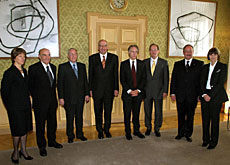Personalities dominate Swiss politics

Last October’s election results indicate that the Swiss tend to vote for personalities rather than parties, according to a report published on Friday.
The study also reveals that first-time voters were attracted to the rightwing Swiss People’s Party, which emerged as the strongest political force.
The independent report – coordinated by the Institute for Political Science at Zurich University – found that cabinet ministers are influencing the way people vote more than they did in the past.
“People’s opinions of individual politicians have a major influence on the way they cast their vote,” said Romain Lachat, co-author of the survey.
Interior Minister Pascal Couchepin’s call to extend the legal retirement age is believed to have cost his centre-right Radical Party a number of votes.
The report also concluded that the People’s Party benefited from the popularity of its former figurehead, Christoph Blocher.
The People’s Party’s success at the ballot box led Blocher to challenge the weakened centre-right Christian Democrats for a second seat in the seven-member cabinet.
Just two months after October’s election, Blocher ousted one of the two serving Christian Democrat ministers when he was elected to government.
New voters
The study found that the People’s Party – traditionally supported by Switzerland’s farmers – picked up votes across the board.
“It has always been a Protestant party in the past, but the People’s Party has begun to appeal to Catholics as well,” said Lachat.
The People’s Party, which is against closer ties with the European Union, unsurprisingly picked up the Euro-sceptic vote.
But Lachat says the party fell out of favour with some high-income voters who were looking for tax breaks.
The Radicals, considered to be the political party with the strongest ties to Switzerland’s powerful business community, saw many of their traditional voters switching allegiance and voting instead for the People’s Party.
Losing ground
The survey confirmed that the centre-right Christian Democrats have been losing ground over the past decade.
The party’s electoral base has been steadily melting away, but Lachat concludes that it did manage at the last election to attract a larger-than-expected share of younger voters.
The study showed, however, that the Green Party – which does not have a seat in government – remains a popular political force with young voters.
According to Lachat, the centre-left Social Democrats found it difficult to mobilise support at the last election, even though the party succeeded in holding on to its share of the vote.
Most Social Democrat voters are aged between 25 and 64 and tend to be employed in healthcare, social work or teaching. People on lower incomes also tend to support the party more than those earning higher salaries.
Voter turnout
Voter turnout increased by three percentage points to reach just over 45 per cent at the 2003 election.
The authors of the report say this can be partly explained by the fact that more 18- to 24-year-olds turned out to vote than in previous elections.
Postal votes may have also contributed to higher turnout, with nine out of ten citizens casting their ballot this way in some places.
The People’s Party earned more than a quarter of the vote last October, closely followed by the Social Democrats.
The Radicals won 17 per cent of the vote, while the Christian Democrats trailed home in fourth place with 14 per cent.
swissinfo with agencies
The study was coordinated by the Institute for Political Science at Zurich University.
It is based on surveys conducted by the Link Institute.
The poll is based on interviews with 5,900 voters.
Similar surveys were carried out after elections in 1995 and 1999.

In compliance with the JTI standards
More: SWI swissinfo.ch certified by the Journalism Trust Initiative




You can find an overview of ongoing debates with our journalists here. Please join us!
If you want to start a conversation about a topic raised in this article or want to report factual errors, email us at english@swissinfo.ch.